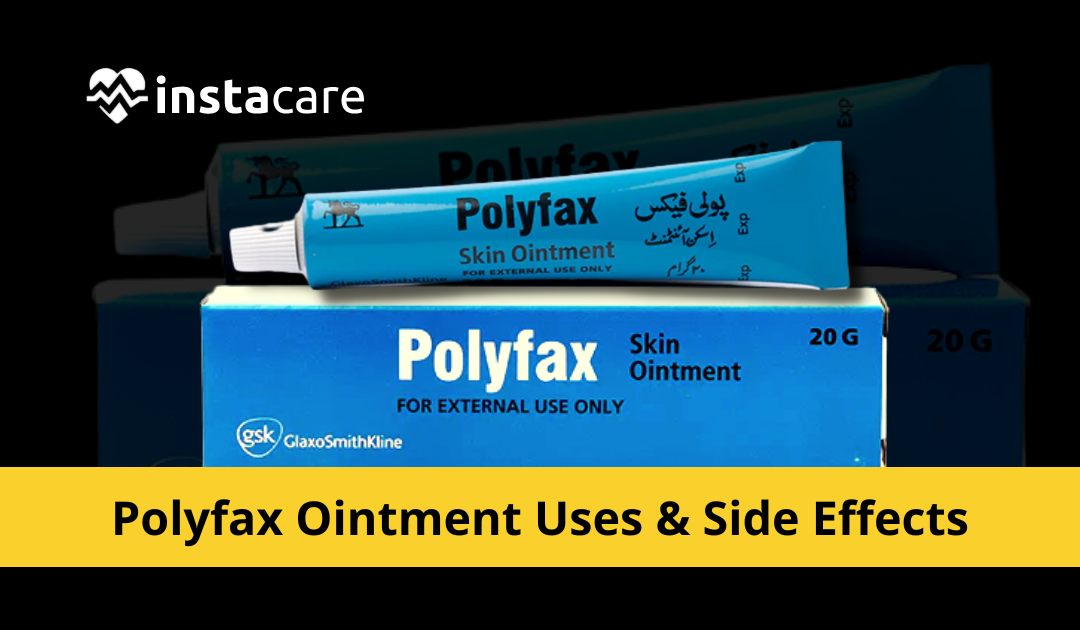Topical ointments like Polyfax are used to treat skin conditions. It contains an antibiotic and a corticosteroid that works in tandem to treat skin infections and inflammation. Eczema, psoriasis, and dermatitis are just a few skin conditions that can be treated with Polyfax ointment. It also works well to lessen inflammation and calm irritated skin and comes in over-the-counter and prescription forms.
Uses And Dosage Of Polyfax
- In terms of polyfax skin ointment uses, the dosage entirely depends on the doctor's instructions. Consult a doctor if you have polyfax at home to alleviate your concerns.
- The doctor must reduce the maximum dosage if impaired kidney function is seen.
- Polyfax skin ointment uses indicate that it should be applied to the skin after removing crusts, pus, and debris. Depending on how severe the infection is, polyfax cream must be used. It is frequently advised to use a maximum of 2 to 3 applications.
How Does Polyfax Work
- The two main active ingredients in Polyfax ointment are polymyxin B and bacitracin. These two drugs fall under the category of antibiotics. Bacterial infections are treated with antibiotics.
- Bacitracin and Polymyxin B are efficient because they eliminate the pathogens responsible for the infection. The microorganisms are eradicated using a variety of techniques.
- Bacitracin and Polymyxin B, two antibiotics, respectively, target bacteria by adhering to their cell membranes. Bacteria need both cell walls and membrane structure to survive and reproduce. Cell membranes serve as a barrier to prevent the escape of the cells' contents and the entry of foreign substances. When the cell walls and membranes are damaged, the bacteria die.
Use Of Polyfax Ointment On Face and Acne:
- In the affected areas, Polyfax ointment should be applied twice daily. For more severe infections, the application may occasionally be required.
- Just before applying Polyfax, wash your hands.
- If a dressing is required, ask your doctor or nurse before applying it to the treated area.
- Avoid applying any other creams, ointments, or lotions to the area of the skin that has been treated with the antibiotic cream for at least 30 minutes after doing so.
- Observe your doctor's treatment recommendations.
Before Using Polyfax Ointment
If you have an allergy (hypersensitivity) to polymyxin B sulfate, bacitracin zinc, or other antibiotics of a similar class, do not use Polyfax Ointment. An allergic reaction may also manifest as a rash, itching, wheezing or swelling of the face, lips, neck, or tongue.
Use caution when applying Polyfax Ointment if you:
- Using 200g or more of Polyfax Ointment every day as an adult
- Have a child who consumes too much
- Have a kidney condition
When Polyfax Ointment is consumed in large doses, toxicity may result. Your physician should monitor your kidney function because Polyfax Ointment is used to treat a wide range of skin conditions. In prolonged use, fungi and other microorganisms that Polyfax Ointment cannot kill may flourish, leading to an infection.
Taking Other Medications With Polyfax
If you are also taking any other medications besides polyfax skin ointment, make sure to let your doctor or pharmacist know. In the body, certain substances can lead to problems when they interact with Polyfax ointment. Among them is:
If you have already absorbed a significant amount of polyfax ointment, a neuromuscular blocking medication used during surgery may substantially affect depressing respiration.
There are possibilities that the polyfax ointment is beneficial for you, but the doctor must make that call.
Polyfax For Pregnant Women
If its applied to large areas of skin, it is not advised for use by pregnant women because it is more likely to absorb significantly into the bloodstream. If your doctor deems it necessary, it should only be used during pregnancy. If your doctor also has prescribed this medication, you should tell them immediately if you are pregnant or think you might be.
Side Effects Of Polyfax
Medication side effects and their potential impact on an individual can vary. Some of the known polyfax side effects include the ones listed below. Not every person who uses this medication will experience the side effects mentioned here or any other adverse effects.
Every person will experience the potential adverse effects of polyfax usage very differently. Although polyfax does have some side effects, not everyone who uses the ointment will experience them. Following are a few of them.
- Skin Irritation
- Nerve Issues
- Kidney Problems
- Skin Allergies
Conclusion
The drug's manufacturer may have reported not all the side effects listed above. To learn more about any additional potential risks associated with this medication, please read the instructions that come with it or speak with your doctor or pharmacist.
Please book an appointment with the best Dermatologist in Lahore, Karachi, Islamabad, and all major cities of Pakistan through InstaCare, or call our helpline at 03100002273 to find a verified doctor for your disease.
Source: https://instacare.pk/blog/polyfax-skin-ointment-uses











